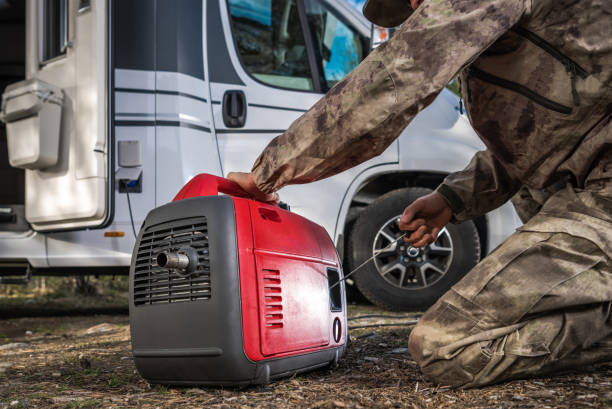How Often Should an RV Generator Be Serviced?
Owning an RV comes with the freedom to explore the open road, but it also requires a commitment to regular maintenance to ensure everything runs smoothly. One of the most critical components of your RV is the generator, which powers your appliances, lights, and other essential systems when you’re off the grid. Proper maintenance of your RV generator is key to its longevity and performance, but how often should it be serviced? This article will explore the recommended service intervals, key maintenance tasks, and why regular upkeep is essential for your RV generator.
Understanding Your RV Generator
Before diving into the specifics of how often your RV generator should be serviced, it’s important to understand how these generators function and what can go wrong if they’re not properly maintained.
RV generators are typically powered by gasoline, diesel, or propane and are designed to provide power when you’re not connected to shore power. They allow you to run your air conditioner, microwave, and other electrical appliances while camping in remote areas. However, because these generators operate in a variety of conditions—from extreme heat to freezing temperatures—they require regular maintenance to function reliably.
Recommended Service Intervals
The frequency of servicing your RV generator depends on how often you use it, the type of fuel it uses, and the manufacturer’s recommendations. However, a general rule of thumb is to perform basic maintenance every 100 to 150 hours of operation or at least once a year, whichever comes first.
1. Routine Maintenance Every 100 Hours of Operation
After every 100 hours of use, or approximately once a year, you should conduct routine maintenance. This includes checking and changing the oil, inspecting the air filter, and checking the spark plug. If you use your generator frequently, such as during long trips, it’s essential to monitor the hours of operation closely.
- Oil Change: Just like in your car, the oil in your RV generator needs to be changed regularly to keep the engine running smoothly. Old oil can become contaminated with dirt and debris, reducing its effectiveness and potentially causing damage to the engine. For most RV generators, the oil should be changed every 100 hours of use. Always refer to the manufacturer’s guidelines for the recommended type of oil and change intervals.
- Air Filter Inspection: The air filter prevents dust and debris from entering the engine. A clogged or dirty air filter can restrict airflow, reducing the generator’s efficiency and potentially leading to engine damage. Check the air filter every 100 hours of operation and replace it if it’s dirty or damaged.
- Spark Plug Check: The spark plug ignites the fuel-air mixture in the engine. Over time, spark plugs can become fouled or worn out, leading to poor performance or difficulty starting the generator. Inspect the spark plug every 100 hours of operation and replace it as needed.
2. Comprehensive Service Every 300 Hours of Operation
In addition to routine maintenance, your RV generator should undergo a more comprehensive service every 300 hours of operation or once every two to three years, depending on usage. This service should include the following tasks:
- Fuel System Inspection: The fuel system includes components such as the fuel filter, fuel pump, and fuel lines. Over time, these components can become clogged or wear out, leading to poor performance or even engine failure. A professional technician should inspect the fuel system every 300 hours of operation and replace any worn or damaged parts.
- Cooling System Check: The cooling system helps regulate the generator’s temperature, preventing it from overheating. This system includes the cooling fan, radiator, and coolant levels. During the 300-hour service, have the cooling system inspected and serviced as needed to ensure it’s functioning properly.
- Exhaust System Inspection: The exhaust system carries away harmful gases produced during combustion. It’s important to check the exhaust system for leaks, cracks, or corrosion every 300 hours of operation. A damaged exhaust system can lead to dangerous fumes entering your RV, so it’s crucial to address any issues immediately.
- Valve Adjustment: The valves in your generator’s engine control the flow of fuel and air into the combustion chamber and the exhaust gases out of it. Over time, these valves can become misaligned, affecting the engine’s performance. A valve adjustment should be performed by a qualified technician every 300 hours of operation to ensure optimal performance.
3. Seasonal Maintenance
In addition to the hourly service intervals, you should also perform seasonal maintenance on your RV generator, especially if it’s been sitting unused for an extended period. This is particularly important before storing your RV for the winter or taking it out for the first trip of the season.
- Running the Generator Regularly: Even if you’re not using your RV, it’s important to run the generator for at least 30 minutes every month. This helps keep the engine components lubricated, prevents fuel from becoming stale, and ensures the battery remains charged. When running the generator, make sure to put a load on it by turning on a few appliances to simulate real usage conditions.
- Fuel Stabilizer: If you plan to store your RV for an extended period, add a fuel stabilizer to the fuel tank. This helps prevent the fuel from breaking down and clogging the fuel system. After adding the stabilizer, run the generator for a few minutes to ensure the treated fuel circulates through the system.
- Battery Maintenance: The battery is essential for starting the generator. Before storing your RV, check the battery’s charge level and clean the terminals. If the battery is weak, consider replacing it. During storage, disconnect the battery or use a battery maintainer to keep it charged.
Why Regular Service is Essential
Regular servicing of your RV generator is not just about keeping it running; it’s about ensuring it operates efficiently and safely. Neglecting maintenance can lead to a host of problems, including:
- Reduced Performance: A poorly maintained generator may not produce enough power to run all your appliances, leading to inconvenient outages.
- Increased Fuel Consumption: A generator that’s not running efficiently will consume more fuel, costing you more money over time.
- Engine Damage: Without regular oil changes and air filter inspections, dirt and debris can build up in the engine, leading to wear and tear and potentially costly repairs.
- Safety Risks: Issues like a clogged exhaust system or leaking fuel lines can pose serious safety risks, including fire hazards or carbon monoxide poisoning.
Signs Your Generator Needs Service
While following the recommended service intervals is important, there are also signs that your generator may need attention sooner. Here are a few indicators that it’s time to service your generator:
- Difficulty Starting: If your generator struggles to start or takes longer than usual to turn over, it may need a new spark plug, an oil change, or other maintenance.
- Unusual Noises: Grinding, knocking, or other unusual sounds coming from the generator are signs of mechanical issues that should be addressed immediately.
- Excessive Smoke: If you notice black or white smoke coming from the exhaust, it could indicate a problem with the fuel or oil system.
- Reduced Power Output: If your generator isn’t producing as much power as it used to, it may need a thorough inspection and service.
- Strong Odors: A strong smell of fuel or exhaust could indicate a leak or another serious issue that needs immediate attention.
Conclusion
Your RV generator is an essential part of your motorhome, providing the power you need to enjoy your adventures to the fullest. Regular servicing, based on the manufacturer’s recommendations and the usage of your generator, is crucial for maintaining its performance and longevity. By conducting routine maintenance every 100 hours, performing comprehensive service every 300 hours, and addressing any issues as they arise, you can ensure your generator remains reliable and efficient.
Remember, a well-maintained generator not only saves you money on repairs and fuel costs but also provides peace of mind, knowing that you have a dependable power source no matter where the road takes you. Whether you’re a weekend warrior or a full-time RVer, taking the time to service your generator is a small investment that pays off in the long run.














Post Comment